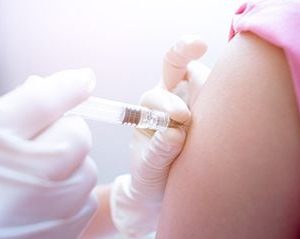- Could Your Grocery Store Meat Be Causing Recurring UTIs?
- Are You Making This Expensive Thermostat Error This Winter?
- Recognizing the Signs of Hypothyroidism
- 10 Strategies to Overcome Insomnia
- Could Artificial Sweeteners Be Aging the Brain Faster?
- Techniques for Soothing Your Nervous System
- Does the Water in Your House Smell Funny? Here’s Why
- Can a Daily Dose of Apple Cider Vinegar Actually Aid Weight Loss?
- 6 Health Beverages That Can Actually Spike Your Blood Sugar
- Treatment Options for Social Anxiety Disorder
Most U.S. Parents Plan to Vaccinate Kids Against Flu, RSV: Survey

Most parents plan to have their kids vaccinated against influenza and respiratory syncytial virus (RSV), even as COVID-19 vaccine acceptance flags, a new poll finds.
Seven in 10 parents (71%) plan to have their children get an RSV jab and six in 10 (63%) plan to get their kids the flu vaccine, according to poll results published recently in the journal Vaccine.
However, just 40% say they’ll get their kids vaccinated against COVID.
The study focused on parents’ preparation for the so-called “tripledemic” that public health experts anticipate this winter.
Parents who plan to get their kids vaccinated tend to be concerned about the diseases, trust their health providers and have children who were previously vaccinated, said poll director Simon Haeder, an associate professor of health policy and management in Texas A&M University’s School of Public Health.
“Those who were opposed said they were concerned about vaccine safety and necessity, and believed they lacked information about the vaccines,” Haeder said in a university news release.
Vaccine hesitancy has been a concern since long before the pandemic, with rumors spurring resistance to childhood MMR (measles, mumps and rubella) and HPV (human papillomavirus) vaccines, Haeder said.
“From a public health perspective, vaccine hesitancy has a ripple effect that extends beyond the individuals involved, even though they might tragically become ill or even die from a preventable disease,” Haeder said. “Low vaccination rates place marginalized communities, such as people living in poverty, and vulnerable populations, such as the elderly, at greater risk for contracting a disease.”
Given this, vaccine requirements for school-aged children are particularly important in containing the spread of infectious disease, Haeder said.
Children tend to be healthier and thus see the doctor less often than adults, Haeder said. That means they’re less likely to get vaccinated unless there’s a mandate.
“With the newly developed antibody immunization against RSV, in addition to vaccines against influenza and COVID-19, we have a unique opportunity to avoid illness and death this fall and winter,” Haeder said.
“But vaccine hesitancy — along with the elimination of COVID-19 funding and a belief that the pandemic is behind us — make it likely that the United States will experience an excessive amount of preventable illness from COVID-19, influenza and RSV this fall and winter,” he added.
More information
Yale School of Medicine has more about the “tripledemic.”
SOURCE: Texas A&M University, news release, Dec. 13, 2023
Source: HealthDay
Copyright © 2026 HealthDay. All rights reserved.










